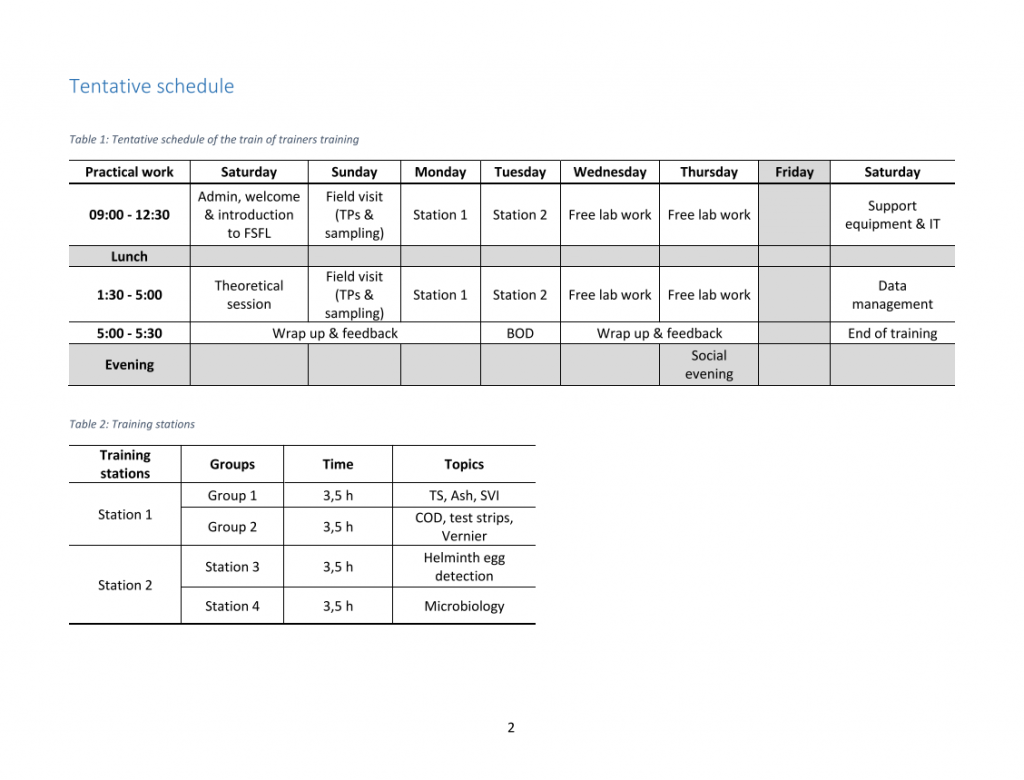The training concept for the Faecal Sludge Field Laboratory was developed during the FAST project and has been refined during the deployment to Cox’s Bazar, Bangladesh.
The shareable resources from the laboratory technicians training in Cox’s Bazar can be downloaded in the resources section.
Target groups
The training concept was developed for experience WASH experts with a professional (academic and tradecraft) water/environmental laboratory background. The training aims to familiarize laboratory technicians with the adapted analytical methodology and the support systems of the Faecal Sludge Field Laboratory.
Requirements
For conducting a laboratory technicians training the following points have to be considered
- Venues
- Laboratory space
- Lecture hall
- Faecal sludge/wastewater treatment plant for sampling and field trip
- Logistical support (some examples)
- Transportation between venues
- Food and drinks for trainees
- Printer for handouts and documents
- video projector
- office supplies (e.g. pens, note pads)
- laboratory supplies
The laboratory space needs to be modified and laboratory equipment needs to be rearranged to accommodate several small groups without hindering each group.
For the theoretical inputs during the training a lecture hall will be needed for two days.
Samples for the station training and the free laboratory work are needed. Furthermore, a field trip for sampling training and to better understand the operation of faecal sludge/wastewater treatment plants is needed.
Schedule
The training has been designed as a seven day course. The table shows the schedule of the training conducted in Cox’s Bazar, Bangladesh during the Faecal Sludge Field Laboratories deployment to the IFRC Population movement operation.
- Theoretical sessions
- Admin & welcome – Time slot for needed administration work and welcome games to start of the training
- Part 1 – This sessions includes an introduction to the Faecal Sludge Field Laboratory, analysed parameters, treatment processes, safety issues, sampling and laboratory operations
- Part 2 – this input focuses on support/IT equipment and data management
- Field visit/field trip – it is important to practically explain the sampling methods and to show the trainees the operation of faecal sludge treatment plants
- Training stations – the trainee group is split in small groups and have the analytical methods practically explained.
- Free laboratory work – in this session the trainee group have to work on their own to analyse samples from treatment plants to characterize influent and effluent.

Trainee group size
The trainee group is normally determined by a) the available equipment and b) available laboratory trainers for the practical training sessions.
Using training stations for the practical training, theoretically, up to 6 small groups can be formed.
Due to the number of trainers present at previous training 3 small groups were formed most often. In the training in Cox’s Bazar the overall group (8 trainees) was split in two smaller groups, because two laboratory trainers were available.
In general, all training conducted by the Austrian Red Cross or its staff had a ratio of 4-5 trainees per trainer. This ratio has worked out well. More trainees per trainer are not recommended. The lower the number of trainees per trainer the better.
With the deployment version of the Faecal Sludge Field Laboratory up to 8 trainees can be trained, however with some compromises during the practical training stations and the free laboratory work sessions. However, training four trainees with two trainers would be optimal for a deployment version laboratory.
Laboratory training add-on module
The training conducted by the Austrian Red Cross (e.g. Kampala or Cox’s Bazar) has shown, that the deployment version of the FSFL has only a limited use as a training laboratory.
To enable easy training of laboratory technicians, during the development of the Faecal Sludge Field Laboratory version 2020, an add-on module for laboratory training was developed. This module adds certain equipment which allows the simultaneous training of 4-5 WASH experts.
The additional equipment is specified in the FSFL equipment list.
